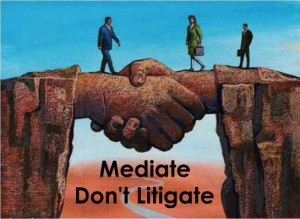Introduction to Mediation Principles
Mediation is a method used to settle disputes and is probably the most widely used, popular and successful ADR (Alternative Dispute Resolution) method. The generally accepted definition of a mediation is that it is a process of assisted negotiation in which an independent person, the mediator, assists parties to resolve their dispute and assists them to jointly decide the terms of their settlement agreement.

Mediation Principles avoid Litigation
Mediation is an informal process with no strict rules of procedure. Instead the mediation principles of privacy, confidentiality and without prejudice negotiations are terms participants to a mediation agree to respect. In most cases mediation still remains a voluntary process in that nobody is forced into mediation although Mediation Information Assessment Meetings (MIAM’s) for parties petitioning for divorce is now compulsory (see family mediations).
Mediation is also generally a very speedy and cost effective way of settling a dispute. Whilst all disputes have different circumstances a general rule of thumb is that a one day mediation could total approximately 13 hours, 8 hours mediating time, plus several hours pre-mediation preparation time. The costs of the mediation are normally shared equally between the parties with mediators fees starting from as little as £20 per hour and with settlement rates of between 70% to 80%, mediation really does represent cost-effective value.
Mediation is private and confidential, speedy and cost effective process with a high settlement rate. What more could you want?
